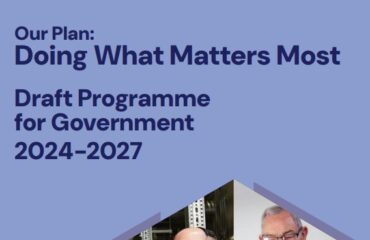Ten questions for the REUL Bill in Northern Ireland

To consider the implications of the Retained EU Law (Revocation and Reform) Bill (REUL Bill) in the context of Northern Ireland, is to play a game of 20-questions. Whilst the technical complexity of the Bill has been considered by Prof Maria lee, and the devolved implications by Dr. Viviane Gravey and Prof Colin Reed, here, we seek to focus in on the uniquely multidimensional context of the REUL Bill in Northern Ireland – which already brings us to 10 questions for REUL Bill in Northern Ireland.
From a specific legislative exclusion, to nuances around the Protocol and the NI Protocol Bill, the over-shadowing absence of functioning political institutions, and the implications for the environment across the island of Ireland, the REUL Bill in Northern Ireland is quite simply a headache. As departments and experts come to terms with the scope and implications of this Bill, we believe it is pertinent to set out several fundamental questions. These are the known unknowns of the REUL Bill in Northern Ireland, which provide a starting point from which the complexities of the Bill can, we hope, be untangled. This blog post provides a short list of ten of the most pressing questions. To find out more about the issue, please read our new policy brief The known unknows of the Retained EU Law (Revocation and Reform) Bill in Northern Ireland.
Scope of the REUL Bill in Northern Ireland
The REUL Bill is unprecedented in scope. However, neither the sum of laws within Northern Ireland, nor the sum of UK retained EU law that have devolved implications for Northern Ireland that may be subject to automatic revocation, replacement, or assimilation are unknown.
- To what extent does the Clause 1(1) apply in Northern Ireland?
The REUL Bill and the Northern Ireland Protocol
Debate surrounding the Protocol on Ireland/Northern Ireland (Protocol) is ongoing, but whether it remains as written, slightly amended, or significantly altered it will directly interact with the REUL Bill.
- How would the disapplication of ‘supremacy and general EU law principles’ in REUL Bill effect the application of supremacy and general EU law principles under the UK-EU Withdrawal Agreement and Protocol (given effect in EUWA 2018)?
- Are instruments of EU law that partially apply under the Protocol subject to clause 1(1) sunsetting? If yes, how does this work in respect to UK(NI) – can these laws that currently (presumably) apply as a ‘mixture’ of REUL and Protocol applicable law be ‘split’?
The REUL Bill and the NI Protocol Bill
Due to the Protocol, (former and current) EU law in the UK already existed differently in NI compared to the rest of the UK. The conjunction of the REUL Bill and the NI Protocol Bill is further complexifying the situation in NI, with yet more categories of laws with different enforcement mechanisms.
The crucial point in considering the REUL Bill is that under the NIP Bill some parts of the Protocol and EU laws it makes applicable to and in Northern Ireland, could (without the REUL Bill) still be subject to the principle of supremacy and general principles of EU law and a continued (albeit much more distant) role for the CJEU.
- What are the implications of the disapplication of ‘supremacy’ principle under the REUL Bill for the operation of the NIP Bill [Act] given the latter provides for the potential continuation of the principle of supremacy, general EU law principles and the applicability of CJEU case law?
- How does NIP Bill ‘protection’ of Article 11 work with clause 1(1) ‘sunsetting’ of many aspects of REUL that currently make N-S cooperation possible?
The REUL Bill and North-South Cooperation
North-South cooperation relies to a significant extent on REUL.
- How will REUL Bill provisions/processes (including sunsetting, exclusions, restatement etc.) account for and accommodate N-S cooperation on the island of Ireland?
The REUL Bill and the UK Internal Market Act
There is a very real risk of undercutting of UK(NI) businesses and producers who are required (under the current Protocol) or who choose (under a revised Protocol / NIP Bill) to follow EU standards on goods in areas where UK(GB) businesses and producers (under the REUL Bill) opt to deregulate.
- How do provisions/processes in the REUL Bill ensure that UK Ministers can/will uphold their obligations under s46 of the UKIM Act to facilitate the free flow of goods GB-NI and NI-GB (i.e., not introducing more barriers as consequence of difference in standards)
- What does this mean for Northern Ireland’s place in UK Internal Market if REUL bill pushes for deregulation in GB, which cannot be followed in areas covered by Protocol in NI?
The REUL Bill with no NI Assembly and Executive
The stalemate at Stormont creates a further unique complication to both scrutiny of the Bill, and realisation of its core purpose. During this period of political restriction, established processes of law-making, including Executive meetings, Assembly debates, Committee hearings and public scrutiny more generally have been halted. Any assessment of how the Bill’s powers and processes may be affected by the ongoing political instability in Northern Ireland must be publicised. And should this political vacuum continue – a seemingly real possibility – clarity is needed on:
- How will the REUL Bill be scrutinised? How can the UK Government seek consent from Northern Ireland?
- How will the process of reviewing and revoking, replacing, or restating retained EU law by 2023 be carried out in Northern Ireland?
These unanswered questions regarding the capacity (or lack thereof) of officials and politicians in Northern Ireland to scrutinise the REUL Bill and the (extensive) legislative processes it would catalyse (regarding review, revocation, replacement, restatement) would be the latest addition to an ever-growing list of unaddressed legislative and policy issues in the absence of fully functioning government. This is also why, taken together, the extent of discretionary These unanswered questions regarding the capacity (or lack thereof) of officials and politicians in Northern Ireland to scrutinise the REUL Bill and the (extensive) legislative processes it would catalyse (regarding review, revocation, replacement, restatement) would be the latest addition to an ever-growing list of unaddressed legislative and policy issues in the absence of fully functioning government.
This is also why, taken together, the extent of discretionary powers granted to UK Ministers under the REUL Bill and under the NIP Bill is so concerning. For Northern Ireland, it is very difficult to conceive of how, if enacted, these two pieces of legislation, as drafted, can be conducive to good governance and effective policy-making but, unfortunately, this is the harsh political reality we face.




